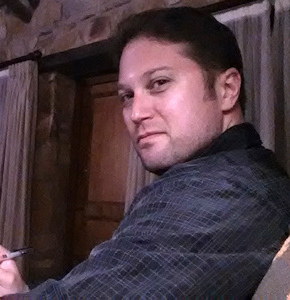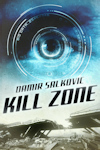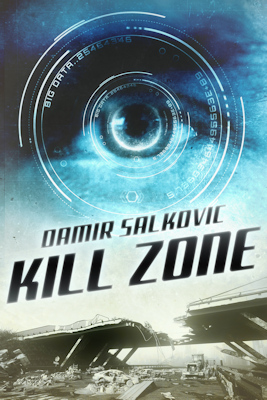Damir Salkovic
 |
Damir’s short fiction has been featured in the Lovecraft Ezine,
Dimension6 Magazine, and in horror and speculative fiction
anthologies by Gehenna & Hinnom Books, The Bolthole, Source
Point Press, Grinning Skull Press, Ulthar Press and others. He
lives in Virginia and earns his living as an auditor, a
profession that supplies nightmare material for his stories and
plenty of writing time in the form of long-haul flights and
interminable layovers.
https://darkerrealities.wordpress.com
https://www.goodreads.com/author/show/7224637.Damir
|
New Title(s) from Damir Salkovic

Click on the thumbnail(s) above to learn more about the book(s) listed.
Order Kill Zone in Print NOW!
 |
Frank Clayton’s life has fallen apart in the
wake of his son’s death. His wife has left him, he has been
blacklisted from employment and his citizen-consumer status had
been taken away, leaving him no choice but to enlist in a
murderous reality show. When an opportunity comes up to escape
his predicament, he finds out that he still has something to
live for: revenge.
Armed with wealth and influence, Frank decides to bring the war
to the studio, the powerful corporations and the society that
has forced him to make an impossible choice. But hidden
interests are manipulating him, trying to turn him into a pawn
of the very forces he’s fighting against. The world he moves in
now is every bit as lethal as the trenches and machine guns of
the kill zone.
Excerpt
Word Count: 89100
Buy at:
Smashwords (all formats) ~ Barnes and Noble ~ Amazon
Price: $4.99
|
 |
ORDER Kill Zone in PRINT TODAY!
(ISBN: 978-1-61950-617-6) |
| |
|
| |
|
| Excerpts |
Kill Zone |
One
They left the trenches right after the sirens and made their way
through collapsed houses and wreckage. Progress was slow; the
men cursed and groaned as they clambered over broken beams and
piles of junked machinery.
Dawn was just breaking, a thin white line on the edge of the
flat, featureless horizon. Watery light trickled through the
smoke and dust, across the bombed-out buildings and courtyards,
but the rutted streets under the shattered skyline were still
awash in shadows. Already the air was heating up, promising
another blistering day.
Clayton hung at the rear of the infantry column, keeping his
eyes on the back of the man in front of him, placing each foot
as carefully as he could, feeling grit and ash crunch under the
soles of his boots in the dark. He supposed he had been lucky so
far. In the first episode of the show, his assault company had
alighted on the killing beach long after the worst of the
massacre was over, encountering only sporadic enemy fire. Days
later, as they hunkered down in the remains of a razed village
during the push inland, a soldier from another unit had told
them that thousands had died during the landing, many of them
never making it off the barges. The body count exceeded all
network estimates and the advertising revenue was nearly double.
Ninety-two percent up from last quarter, the man had shouted
over the dull thump of explosions, like he was reading a
corporate propaganda piece. The feverish shine in his eyes, the
pride in a job well done, had made Clayton sick to his stomach.
Death was everywhere. Death in the lenses of hidden cameras,
playing on high-definition screens, over and over, to the cheers
of a faraway crowd. Sooner or later it would be his turn.
But he was still breathing, still walking. He wasn’t a corpse.
The squad moved out of the ruins, into the open space of a
rubble-strewn square. The sound of running water reached
Clayton’s ears over the stomping of boots and the thump of
distant explosions. Lieutenant Hall called a halt and the
platoon crouched behind a low wall. On the other side of the
wall was a concrete embankment, dark water rushing and swirling
below.
Clayton saw a narrow bridge leading across the river, to a small
stone dock and a row of low, square tenements. It was light
enough now to see the tattered flags hanging from empty windows.
Enemy forces had held the near side of the river until late
afternoon the previous day, when they had been forced across
under concentrated artillery fire. There had been no response so
far from their own guns, entrenched in the earthworks on the
single hill behind town. Command, faceless and cryptic, reported
the enemy was digging in to make a stand. What this meant was
anyone’s guess, but Clayton expected a massacre, and to judge by
the whey faces around him the rest of the unit shared his
sentiment.
Hunched over to avoid the attention of snipers, the lieutenant
moved along the ranks, barking commands. Prescott and Zielinsky
hopped over the wall and moved forward, bent over low and
clutching their rifles, using the crumbling bridge balustrade as
cover. The assault platoon waited in heavy, tense silence,
broken only by coughs and muffled whispers. Kintner started to
light a cigarette and Sergeant Bennings knocked it out of his
hands.
The purpose of luck, Prescott had said in the early days of the
war, was to eventually run out. He had delivered this pearl of
wisdom while the squad was sitting in a farmhouse cellar on the
edge of one of the cleared villages, drinking wine from bottles
made to look dusty and sharing cigarettes. To Clayton the
proclamation had sounded trite, the type of dime store
philosophy without substance or meaning that could sound
insightful only to a mind fogged with tranks and spent
adrenaline. Lately he found himself going back to the words,
turning them over in his sleepless nights. He had thought that
by enlisting he would leave his entire life behind, find a
degree of resigned tranquility, if not peace, in the senseless,
tumultuous grind of the war machine. But some ghosts refused to
be stilled. They came to him in the blackest depths of night, in
the small, still hours just before dawn. No matter how hard he
tried, they always caught him unprepared.
He raised himself and looked over the wall. On the bridge,
Zielinsky stopped and stood on tiptoe to inspect an empty
sandbag emplacement. Prescott hunkered a few steps back,
scanning the pocked façades of the tenement buildings. Zielinsky
glanced over his shoulder. Lieutenant Hall waved him forward.
The two men started to climb.
As if on cue, hell broke loose.
The machine gun opened up as soon as Zielinsky’s boots touched
the other side of the barrier, the bullets tearing through flesh
and canvas alike. Clayton saw the scout crumple backward, saw
Prescott leap down from the sandbag wall and flatten himself
against the set stones of the bridge. Two more guns joined in,
followed by scattered small-arms fire. A cloud of dust and sand
enveloped the emplacement. Bullets whined and chipped the wall
behind which the soldiers were crouching. Panicking, he thought,
surprised by his ability to think clearly and rationally.
They’re panicking. He glanced at the dirty faces around him,
white and strained with fear. Eyes rolling like those of cattle
being led to slaughter. He repressed a terrible urge to laugh.
Lieutenant Hall leaped over the wall and motioned the unit
forward. Clayton could see the man’s mouth opening and closing,
but the crash of gunfire drowned out all sound save for the roar
of blood in his ears, the triphammer beat of his heart.
Invisible guns poured scorching fire from every direction.
Several men went down, but those only grazed hobbled and shoved
ahead, and the platoon charged on, a huge, bellowing animal
frightened into a frenzy. Nothing would stop it now.
Machine guns stitched the embankment, but dust and smoke covered
all, and for the time being the enemy was firing blind.
Clayton’s mind had retreated completely in terror. The thinking
part of him embraced death; the beast in him wanted to live.
Bullets spat at him from the smoke, ripped through flesh,
cracked off the stone of the bridge. He watched his hands shove
a dead soldier aside, his feet scramble over sandbags and bodies
and into the killing field beyond.
He stumbled through a shell crater, found cover, and knelt. Some
of the soldiers had taken cover behind the stone parapet and
were returning fire. The long concrete terrace between the
bridge and the block of houses was littered with dead bodies. He
fired like an automaton, aiming at muzzle flashes, pausing only
to insert a fresh clip into his rifle. Through the settling
dust, he could make out a shape crawling slowly toward the
entrance of the nearest building, halting as the firing
subsided, faster when it picked up again. Under the first floor
windows, out of sight of the defenders, it raised itself to its
knees; Prescott, white as a ghost with dust, pulling a grenade
off his belt and yanking the pin with deliberate, unhurried
movements.
Turning away, he closed his eyes, clapped his palms to his ears
and counted the explosions. When he looked back, smoke was
pouring out of the destroyed doorway and two lower-floor
windows, and the men of the assault platoon were pouring in.
Shots lit up the darkness within. The machine guns were no
longer firing. He saw a soldier in enemy uniform climb out on
the sill of a second-floor window, dangle by his arms for a
moment, then drop the remaining distance. The man grimaced as he
got up and limped into the shadows between the buildings. His
uniform was dark and stuck to his side with blood, and he left a
thin scarlet trail behind him. Clayton shouldered his rifle,
lined up the shot and squeezed the trigger. The soldier’s head
snapped to the side; he fell to his knees and tumbled forward.
|
Back to Kill Zone |
| |
| |
| top |
|
